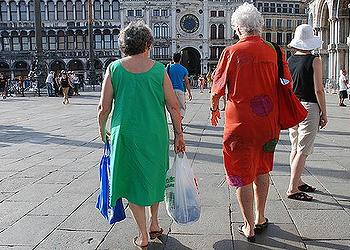
ROME, Italy, April 8, 2013 (ENS) – A year after passing a nationwide plastic bag ban, the Italian government has identified the technical characteristics of plastic bags that can legally be used in a decree published in the Official Journal in March.
Environment Minister Corrado Clini and Economic Development Minister Corrado Passera signed the interministerial decree, which clarifies the requirements of the nationwide plastic bag ban that was enacted into law on March 24, 2012.

Merchants must discontinue the use of traditional single-use plastic bags in favor of bioplastic bags that are biodegradable and compostable or meet other specific requirements.
Sanctions for non-compliance with the law will be enforced effective May 27, 2013. The fines for non-compliance range from €2,500 to €25,000 and may be increased for large quantities of bags.
Biodegradable and compostable plastic shopping bags will still be legal.
Some plastic bags that are not biodegradable or compostable also will be legal, including those with a thickness exceeding 200 microns and containing a percentage of recycled plastic of at least 30 percent if intended food use.
Also legal are plastic bags with a thickness greater than 100 microns and containing a percentage of recycled plastic of at least 10 percent if not for food use.
Also permissible are bags made of reusable paper, fabrics of natural fibers, polyamide fibers and materials other than polymers, according to the decree.
Minister Clini said, “The decree finally clarifies the rules governing the plastic bags, increasing the use of eco-friendly ones, which contribute to a strategy for the decarbonization of the economy that has just been approved by the CIPE.”
The CIPE is Italy’s Interministerial Committee for Economic Planning, an 11-member governmental body headed by the president of the Council of Ministers.
“The measure normalizes the uncertainties that have hindered the development of the production chain, promotes green chemistry and puts Italy in line with the EU,” Clini said.
“The goal is to make sure that the bags are biodegradable and compostable are used mainly in the food sector,” said Clini, “thus helping to reduce the production of waste.”

Giving urgency to finalization of Italy’s plastic bag ban requirements, in March the European Commission launched a public consultation on how to reduce the pollution caused by plastic waste.
On March 7, Environment Commissioner Janez Potocnik released a Green Paper that opens an EU-wide discussion about how to make plastic products more sustainable throughout their life cycle and reduce the impact of plastic waste on the environment.
Potocnik said, “Managing plastic waste is a major challenge in terms of environmental protection, but it’s also a huge opportunity for resource efficiency. In a circular economy where high recycling rates offer solutions to material scarcity, I believe plastic has a future.”
The consultation, which includes 26 questions, will last until the beginning of June 2013.
The result will feed into further policy action in 2014 as part of a broader waste policy review, which will look in particular at the existing targets for waste recovery and landfill as well as an ex-post evaluation of five directives covering various waste streams.
“I invite all stakeholders to participate in this process of reflection on how to make plastic part of the solution rather than the problem,” Potocnik said.
Once in the environment, particularly in the marine environment, plastic waste can persist for hundreds of years. Up to 10 million tons of litter, mostly plastic, end up in the world’s oceans and seas annually, turning them into the world’s biggest plastic trash dump.
Plastic is often perceived as a cheap and disposable material and recycling rates are low. Half of all plastic waste generated in Europe goes to landfill, which Potocnik says should be avoided as plastic can contain hazardous components and disposal can result in undesirable emissions and concentrated, polluting residues.
Copyright Environment News Service (ENS) 2013. All rights reserved.
